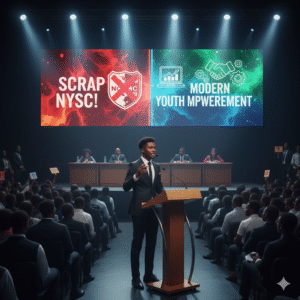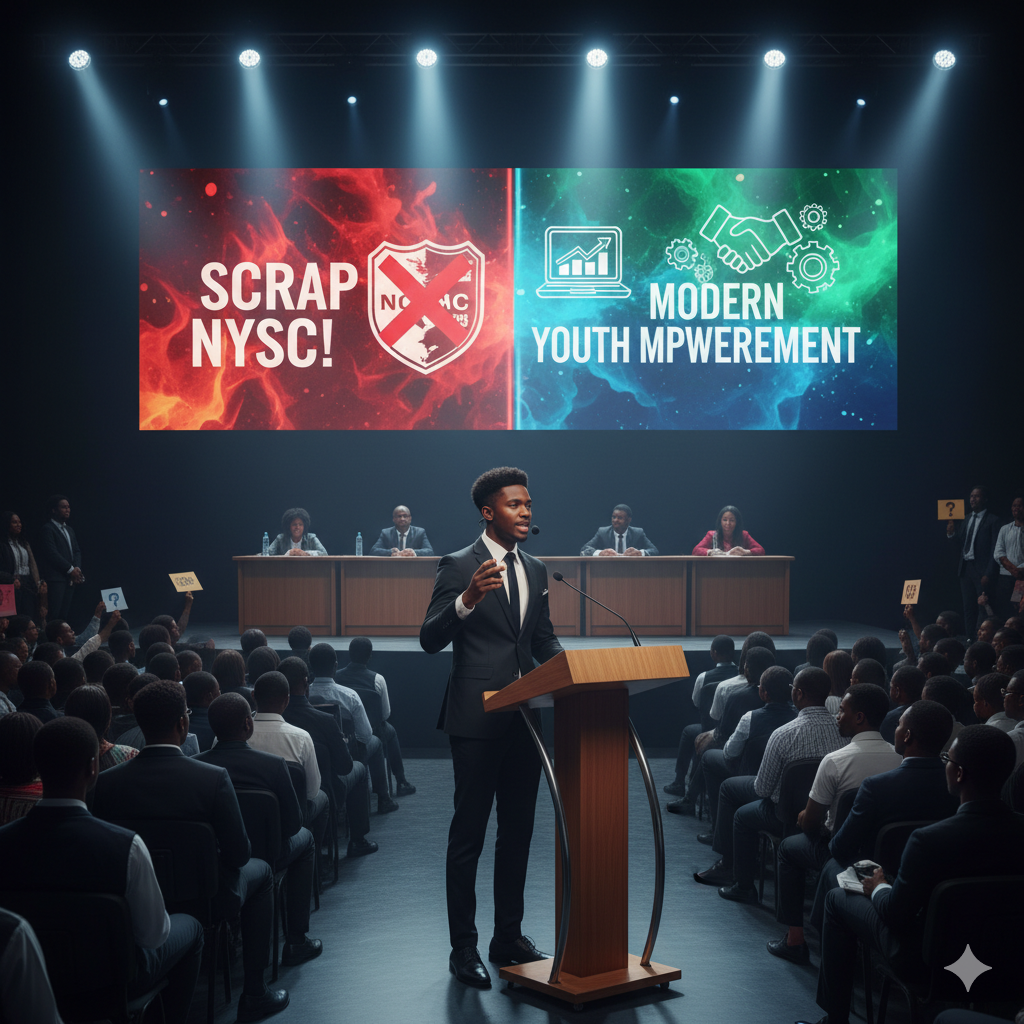Debate: Should The NYSC Be Scrapped? (7 Winning Points For ‘Yes’)
Debate: Should The NYSC Be Scrapped? (7 Winning Points For ‘Yes’)
Looking for the winning points for your next debate? You’ve come to the right place. If you’re arguing for the motion that the National Youth Service Corps (NYSC) scheme should be scrapped, this post is the script you need to convince the judges and win.
This article provides a complete template for anyone supporting the “Yes” side of the debate on should the nysc be scrapped.
First, let’s be clear on what we’re discussing. The NYSC is a one-year mandatory program for all Nigerian graduates. Its original goal was to foster national unity. But the question today is: is it still useful, or is it time to let it go?
Disclaimer: This article is for educational purposes only. It’s a template designed to help students argue one side of a topic. The points made here are to help you build a strong case for your debate and are not intended to diminish the experiences of past corps members or the original intent of the scheme.

Winning Points on Why the NYSC Should Be Scrapped
1. The Unacceptable Risk of Insecurity
A very good day to the panelists, the timekeeper, my co-debaters, and my esteemed audience.
My first and most important point is simple: the NYSC scheme, in its current form, is a threat to the lives of young Nigerians. The level of insecurity across the country is not what it was when the scheme was created. We hear terrible stories every day. Kidnapping, banditry, and terrorism are real threats.
Is it fair to send a young graduate from Lagos, who has never left their state, to a remote village in a region they know nothing about, with no guarantee of their safety? Parents spend millions of naira on their children’s education, only for them to be posted to volatile areas. The truth is, the fear and anxiety this causes for both corps members and their families are immense. National unity should not come at the cost of human lives. It’s a price too high to pay.
2. It’s a Waste of a Productive Year
Now, let’s talk about time. One full year. 365 days. What could a determined, intelligent, and ambitious young graduate do with that time?
They could be enrolled in a professional certification course that makes them employable. They could start a small business. They could be actively job-hunting in their chosen field. Instead, the NYSC scheme puts their lives on hold. Many are posted to do jobs that have absolutely nothing to do with their course of study. An engineering graduate is sent to teach Primary 2 mathematics. A computer scientist is asked to farm.
This isn’t just a waste of time; it’s a waste of potential and a massive waste of the specialized knowledge they spent four or five years acquiring in the university. It’s a delay tactic that postpones the inevitable challenge of graduate unemployment.
3. The Enormous Financial Drain
The NYSC is an economic burden on Nigeria. Think about it. We are talking about billions of naira spent every year on mobilization, corps members’ allowances, and administrative costs. But what is the return on this huge investment?
The money given to corps members (the “allawee”) is barely enough to survive on in today’s economy. The funds sunk into running the scheme could be put to much better use. Imagine if that budget was converted into a startup fund for graduates, providing grants or interest-free loans for them to start businesses. That would create real jobs and contribute directly to the economy.
4. It Fails at Proper Skill Acquisition
The defenders of the scheme often talk about skill acquisition. But let’s be honest about what that really means in camp. The SAED (Skill Acquisition and Entrepreneurship Development) program is often a rushed, two-week crash course in things like bead-making or baking.
While those are valuable skills, they are not a substitute for deep, industry-relevant training. A 2019 report by the Nigerian Institute of Social and Economic Research (NISER) highlighted the need for more robust youth empowerment schemes. The NYSC’s current model is simply not enough to prepare graduates for the modern realities of the global job market. It’s a token effort, not a serious solution.
5. It No Longer Achieves National Unity
The primary goal of the NYSC was to promote national unity. A noble idea in the 1970s after the civil war. But today, does it really work?
Nigeria is more divided than ever along ethnic and religious lines. Sending a graduate to another region for one year doesn’t magically solve these deep-seated issues. In fact, many corps members face discrimination and cultural barriers, making them feel even more like outsiders. True national unity is built on good governance, justice, and equal opportunities for all, not on a one-year compulsory tour.
6. The Scheme is Riddled with Corruption
Let’s not pretend the NYSC is perfect. The entire process is open to manipulation. Wealthy or well-connected parents can influence posting to favorable locations like Lagos or Abuja. Some people even find ways to bypass the service entirely while still getting a certificate.
This corruption undermines the very principle of equality that the scheme is supposed to represent. If it’s meant to be a great equalizer where everyone serves the nation, why can some people buy their way out of the hardship posts? It creates a system of “service for the poor” and “exemption for the rich,” which is fundamentally unfair.
7. Better, Modern Alternatives Exist
My final point is that we can do better. Scrapping the NYSC doesn’t mean abandoning our youth. It means replacing an outdated model with something that works for the 21st century.
What if we replaced it with a one-year mandatory internship program with private companies in the graduate’s field of study? Or a compulsory entrepreneurship program with real funding? Or even an option to serve in the military or other uniformed services for a year? These are practical alternatives that would equip our youth with real-world experience, skills, and a direct path to employment. This is how you truly empower the next generation.
Frequently Asked Questions (FAQs)
What is the strongest argument for keeping the NYSC? The main argument from the opposing side is that the NYSC is the only program that allows young Nigerians to live in and experience cultures outside of their own, which helps to foster national unity and break down stereotypes.
How should I begin my debate speech? Confidence is key. Always start with a proper greeting. We actually have a great guide on how to start a debate with the right greeting that will help you capture the judges’ attention from the first word.
What is a good way to conclude this debate? Summarize your strongest points (insecurity, wasted time, and the existence of better alternatives). End with a powerful statement about the need to evolve and create a system that truly prepares Nigerian youth for the future, not one that holds them back.
Conclusion / Summary
So, there you have it. The arguments are clear. The NYSC, while born from a noble idea, has become an outdated, unsafe, and inefficient system. It exposes our youth to unacceptable risks, wastes a precious year of their lives, and is a significant drain on our national resources.
It’s time to have a serious debate on should the nysc be scrapped and replace it with modern, effective programs that offer real skills, real opportunities, and real safety for our graduates.
Disclaimer: All professions and national programs have their importance. This article is written solely for the educational purpose of preparing for a debate and does not diminish the value of service to one’s country.
What do you think? Drop your opinions in the comments section below. Also, feel free to share this post with your coursemates or those in your team!








2 Comments